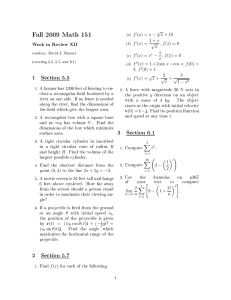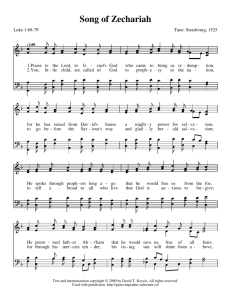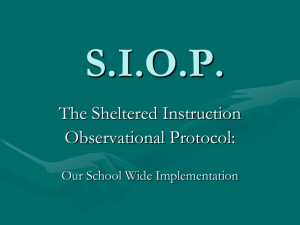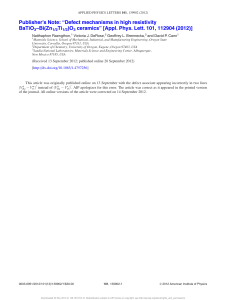Document 11369995
advertisement
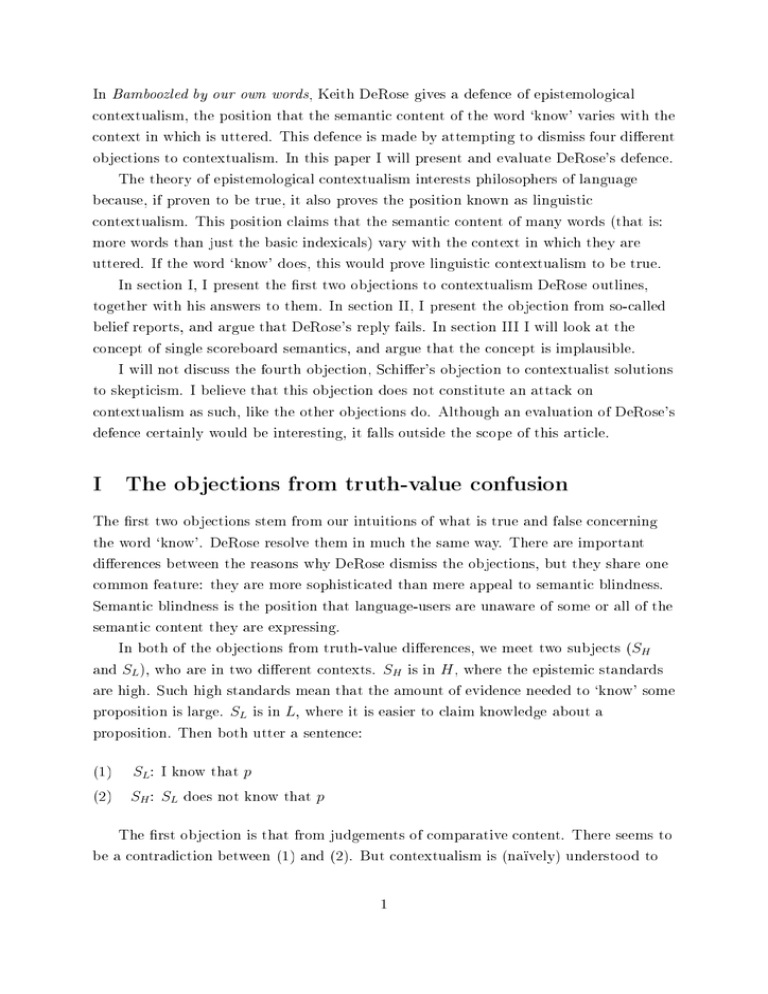
In Bamboozled by our own words, Keith DeRose gives a defene of epistemologial ontextualism, the position that the semanti ontent of the word `know' varies with the ontext in whih is uttered. This defene is made by attempting to dismiss four dierent objetions to ontextualism. In this paper I will present and evaluate DeRose's defene. The theory of epistemologial ontextualism interests philosophers of language beause, if proven to be true, it also proves the position known as linguisti ontextualism. This position laims that the semanti ontent of many words (that is: more words than just the basi indexials) vary with the ontext in whih they are uttered. If the word `know' does, this would prove linguisti ontextualism to be true. In setion I, I present the rst two objetions to ontextualism DeRose outlines, together with his answers to them. In setion II, I present the objetion from so-alled belief reports, and argue that DeRose's reply fails. In setion III I will look at the onept of single soreboard semantis, and argue that the onept is implausible. I will not disuss the fourth objetion, Shier's objetion to ontextualist solutions to skeptiism. I believe that this objetion does not onstitute an attak on ontextualism as suh, like the other objetions do. Although an evaluation of DeRose's defene ertainly would be interesting, it falls outside the sope of this artile. I The objetions from truth-value onfusion The rst two objetions stem from our intuitions of what is true and false onerning the word `know'. DeRose resolve them in muh the same way. There are important dierenes between the reasons why DeRose dismiss the objetions, but they share one ommon feature: they are more sophistiated than mere appeal to semanti blindness. Semanti blindness is the position that language-users are unaware of some or all of the semanti ontent they are expressing. In both of the objetions from truth-value dierenes, we meet two subjets (SH and SL ), who are in two dierent ontexts. SH is in H, where the epistemi standards are high. Suh high standards mean that the amount of evidene needed to `know' some proposition is large. SL is in L, where it is easier to laim knowledge about a proposition. Then both utter a sentene: (1) SL : (2) SH : SL I know that p does not know that p The rst objetion is that from judgements of omparative ontent. There seems to be a ontradition between (1) and (2). But ontextualism is (naïvely) understood to 1 laim that and SL SH 's `know' has a dierent semanti ontent than SL 's. But then both SH ould be right in saying what they are saying, and the ontradition disappears. This is a problem to ontextualism beause it is unintuitive. It seems to suggest that language users who see a ontradition here do not know that the word `know' is ontext-sensitivethey are blind to the semantis of the words they use. (DeRose 2005a, p. 2) DeRose is eager to avoid semanti blindness, and begins by noting that the ontextualist an maintain that there is a ontradition. In DeRose's ontextualism, there is a single (or ommon) soreboard of semantis for all partiipants in a disussion. This means that in a disussion, `know' an only have one semanti ontent. The laims do ontradit eah other, and the ontextualist is spared from the embarrassment of semanti blindness. But who is right, and who is wrong? It seems to depend on how the single soreboard works. I will return to that in setion III, but I note here that DeRose laims that neither of the laims are true. This seems to all for a new defene against another unintuitive result. But there is no suh ontradition, laims DeRose, unless they are atively engaging eah other in an argument. If they are not, they are making ompatible laims beause the semanti ontent of `know' diers between the two ontexts, and they have their own soreboard. And in this ase, our intuition that they are ontraditing eah other is weaker. (DeRose 2005a, p. 4) So, when SL and SH are in truly dierent ontexts and onversations, and assert some surfae-ontraditory laims about knowledge (like (1) and (2)), they are not ontraditing eah other. DeRose is very areful to stress that the standards of H are not neessarily those of philosophial epistemology, but heightened due to some pratial reason, for instane a polie investigation. Nevertheless, when the standards are signiantly dierent, and SL will laim to know a lot more than SH will. In this situation, they are both orret, and aording to DeRose our intuition of a ontradition is weaker than the objetion presumes. The latter part of DeRose's argument is as onvining as the original objetion was. They both appeal to our intuition, and I think DeRose manages to show that our intuition is not as lear-ut as the objetion states. The rst part of the argument, on the other hand, rests entirely on the theory of single soreboard semantis. I will return to this in setion III. The seond objetion is that from metalinguisti laims. We are still using our previous example with utteranes (1) and (2). The objetion is then based on the 2 observation that our subjets would be willing to state the following: (3) SL : (2) is false (4) SH : (1) is false This is a problem for ontextualism, beause aording to ontextualism, both (3) and (4) are wrong, and it seems unlikely that language works in a way that makes people utter falsehoods routinely. (DeRose 2005a, p. 8) As in the ase with the omparative judgement, DeRose stresses that the intuition of a problem only seems to arise when onsidering the wrong ases; the ases where SL and SH are arguing with eah other. Therefore, we primarily look at those ases. Here we need not introdue single soreboard semantis: Contextualism says exatly that SL is allowed to assert his laim (1) without expressing a falsehood, beause `know' is ontext-sensitive. But yet the intuition is strong that ontextualism, SH SH ould say (4). Given would be wrong when asserting (4), yet it seems to be likely that SH would say it. Does this mean that people in general do not know what they say, and an we make sense of a language where rules of truth exist independently of usage? The rst two objetions share muh of the same essential problem. With a ertain interpretation of ontextualism (a naïve one, maybe), the rules of the language dier demonstrably from the rules the language-users seem to subsribe to. DeRose attempts to show that this is not true in every ase, but he admits that the ase of disagreement in a onversation has this problem. On the other hand, invariantism leads to the same problems the other way around. DeRose's defene is oensive on this objetion. He shows how also invariantism must admit some `semanti blindness' in other ases involving metalinguisti laims, and that language-users' intuitions are unlear on matters involving this kind of metalinguisti laims. Therefore, this is not a problem for ontextualism alone. There is something else than ontextualism or invariantism that auses this onfusion. I believe DeRose's argument is sound on this matter, unless someone an provide an epistemologial theory whih does not share these problems. II Belief reports The third objetion is the objetion from belief reports. The objetion states that if a ertain shema of disquotation is orret, it is a problem for ontextualism beause it shows how the verb `know' an be used aross dierent ontexts, and therefore aross dierent epistemologial standards. 3 The partiular shema is from John Hawthorne (Hawthorne 2004, p. 101), and is known as the disquotational shema of `know' (DSK, for short). DeRose has modied the formulation of the shema slightly, and the modiation makes its appliation slightly simpler to use in our disussion. DeRose's shema is formulated like this: If a speaker S1 sinerely utters a sentene of the form `A knows that sentene in the that-lause means that refers to a, then a speaker to mean that p, S2 , p, and the and `A' is a name or an indexial that also using `A' to refer to an truthfully state that p', 1 S1 a and using the that-lause believes that A knows that p. (DeRose 2005a, p. 10) Although DeRose's modied formulation of the priniple is meant to make the onsequent meta-linguisti, he fails to do so orretly. The last part of the last period should read . . . , an truthfully state that `S1 believes that The problem to ontextualism appears when S1 and S2 A knows that p'. are in dierent ontexts, and those ontexts assign dierent semanti values to `know'. If ontextualism is orret, there are ases where that A knows that p, S2 would not be truthful when stating that even after hearing following: S1 said `A knows that p '. S1 utter `A knows that p'. S2 S1 believes an only state the But if the DSK is orret, there are no suh ases. Therefore, ontextualism must be wrong. This objetion rests entirely on the orretness of the disquotational shema, and DeRose presents an argument for its inorretness. His argument is an example where we apparently would not disquote in the way the shema allows us to. 2 low) and a polie interview (high). The example has two ontexts, a bar ( A person (S2 ) overhears another person (S1 ) making some laim in the bar. The laim has the form of S1 knows that Immediately afterwards, p, S2 for instane I know that Jim was at the oe today. is interviewed by the polie, who explain that a serious rime has been ommitted and then ask whether If the disquotational shema is orret, that S1 S2 S1 knows where Jim was today. will always truthfully be able to report believes that she knows that Jim was at the oe. But DeRose argues that the low is very dierent from that in high. For instane, DeRose says S1 would say, while in low, that she knows Jim was amount of evidene needed to laim knowledge in at the oe if the reeptionist told her and she has seen his hat hanging in the hall. But S2 wouldn't tell the polie that S1 believes that she knows Jim was at the oe 1I have modied the formatting in this itation by replaing underlined text with italiised and using subsripts and italiised text for variables. 2 The word `would' is of great importane here. It seems too strit to say that we `ould not' disquote (beause we an do so just to prove it). Yet `would' might be too sloppy. Another possibility is that we would not be orret if we disquote in the way the shema allows us, but this seems to lead attention away from the point DeRose is trying to make, beause he appeals to our intuition of what would be `natural' for the ators in our story. 4 based on this evidene. Beause of this, the disquotational shema is inorret and does not onstitute a real objetion to ontextualism. Furthermore, DeRose suggests that the shema is used only when the epistemologial standards are appropriately similar. Presumably it also applies when But it isn't lear that S1 S2 has a lower standard than S1 , but not the other way. atually would laim that she knows. At least my intuition is unlear on the matter. In DeRose's example S1 is arguing that she knows beause of a $2 bet. But there is a dierene between saying that she knows and doing so truthfully: she might seretly have her doubts, and only say that she knows to win the bet. In fat, if she is asked how do you know that?, she ould easily answer something like well, I don't atually know, but the reeptionist told me, or a shortut like the reeptionist told me. If that is the ase, `know' works more like a rhetorial shortut (and way to win the bet) than atually expressing any knowledge-relation in has artiially S1 . Low low standards in this example, and DeRose's laim that suh a ontext exists seems dubious. A properly designed example should let its ators express essentially truthful statements about their mental states, and not position them in plaes where lies and rhetorial triks are abundant. A defender of the disquotational shema an simply point to the word `sinerely' in the shema, and laim that DeRose has not shown it to be the ase that we would not disquote if S1 is sinere. By stressing this point, we are reduing the usability of the shema. How an S2 know whether shema ould be to hange sinere in saying so, S1 S2 's S1 is sinere? A potential amendment to the potential statement to: To the degree that believes that A knows that p. S1 was Note that this amendment is not due to some inonsisteny in the original shema, only that it requires the statement to be sinere. When this annot be guaranteed, seems highly likely that S2 S2 must make a dislaimer. And then it will tell the polie exatly what the disquotational shema allows her: To the degree that S1 Jim was in the oe. The reason was sinere in saying so, she believes that she knows S2 won't say anything about example is due to the very fat that she (S2 ) doesn't know that S1 's beliefs in DeRose's S1 was sinere when she talked at the pub. But that is something altogether dierent from not disquoting beause of the dierene in epistemologial standard. Maybe S2 suspets that involved as well, and telling the story on the pub to give Jim an alibi? know that S1 S2 S1 was might even is known to tell small lies from time to time? I believe it is this kind of unertainty about sinerity that makes our intuition unlear in the example, not the dierene in ontext. Could we onstrut an example of a similar kind, that avoids the problems of insinerity? DeRose says that the best ases for this general priniple, DSK, are ones where the ontextualist will think there is a marked dierene in standards (DeRose 5 2005a, p. 11). DeRose is also wary of using test ases where one of the ators is in a ontext with very tough standards, like an epistemologial disussion. It makes the relevant pro-ontextualist intuitions stronger and more stable if the elevated epistemi standards in high are tied to a pressing and very pratial onern. . . (DeRose 2005b, p. 176). Therefore, we opt for Cohen's airport example. This is used by Cohen and DeRose elsewhere. 3 Mary and John are at the L.A. airport ontemplating taking a ertain ight to New York. They want to know whether the ight has a layover in Chiago. They overhear someone ask a passenger Smith if he knows whether the ight stops in Chiago. Smith looks at the ight itinerary he got from the travel agent and responds, Yes I knowit does stop in Chiago. It turns out that Mary and John have a very important business ontat they have to make at the Chiago airport. Mary says, How reliable is that itinerary? It ould ontain a misprint. They ould have hanged the shedule at the last minute. Mary and John agree that Smith doesn't really know that the plane will stop in Chiago. They deide to hek with the airline agent. (Cohen 1999, p. 58) In this example, Smith is in a dierent ontext than Mary and John. Mary and John are in high, and Smith is in low. To illustrate an example of the disquotational shema, we need some further dialogue. Let's all the person who asks Smith the question Keith. Keith is our S1 . Mary or John plays S2 , and Smith is A. Would Mary say that Keith believes that Smith knows that the ight stops in Chiago? I think the answer is fairly lear: she would. This kind of example provides no attak on the shema, and the objetion to ontextualism stands. I have shown that DeRose's refutation of the belief report argument against ontextualism is at best inonlusive. Nevertheless, there seems to be something strange about the onept of disquotation. It seems to fore the epistemologial standards of the disquotee onto the disquoter. I am not onvined that the DSK is orret, although DeRose's objetion to it does not prove it wrong. This belief report argument reets a general problem of ontextualism about knowledge. Given ontextualism, it seems to be impossible for two people to have knowledge about eah others knowledge without being in the same ontext. Even if knows p both X in ontext and Y C1 , know and p. Y knows p in ontext C2 , it is not possible for Z X to say that There is apparently no way to ompare knowledge between ontexts, and this is at odds with the way we normally use the onept of knowledge. 3 Although DeRose has re-written it to a disussion on the opening hours of a bank. I nd this peuliar, beause the intuition of not knowing in high is signiantly weaker in DeRose's example, due to the relative trustworthiness of a bank. 6 III Single soreboard semantis If I am orret in asserting that the DeRose's defene of ontextualism rests on his theory of single soreboard semantis, it is interesting to look at this premise as well. In this setion, I argue that the onept of single soreboard semantis is dubious and far from proven to be plausible. If this is the ase, DeRose's defene of ontextualism is equally weak. In Single Soreboard Semantis (DeRose 2004), DeRose presents his theory of sore-keeping in a onversation. The metaphor of sore-keeping is adapted from Lewis (Lewis 1979), but there seems to be important dierenes between DeRose's and Lewis's soreboards. In an interesting note in Single Soreboard Semantis, DeRose seems to suggest that his soreboard exists outside of the minds of the speakers: Here my use of the metaphor soreboard diers from Lewis's. For Lewis, there is a soreboard in the head of eah of these partiipants, and what the sore is an be a funtion in part of what all these dierent soreboards say the sore is. As I use soreboard here, it by denition gives the right sore. (DeRose 2004, p. 19) Even though DeRose delares his use of soreboard to be a metaphor, it seems unlear what this is a metaphor for. In Lewis's ase, it is fairly obvious that the soreboard is a metaphor for the partiipants' internal states of mind. In DeRose's ase, we get to know that it by denition gives the right `sore'whih is the orret tally of semanti ontent for the sentenes in a onversation. It is also lear that DeRose's ontextualism requires this metaphor to be sound, and for a metaphor to be sound it must refer to something that atually exists. The question then beomes what the metaphor of a single, ommon soreboard refers to in the ontext of a onversation. It is tempting to begin with Lewis's soreboards. A single, ommon soreboard ould possibly be shown to be a metaphor for a set of individual soreboards + a set of rules or funtions governing the ombination of these soreboards. If these rules or funtions are onstruted the right way, it ould be possible to redue the metaphor into mental states, and therefore redue DeRose's soreboard to Lewis's soreboards. But DeRose expliitly obstruts this straightforward manner of redution, and I will therefore not attempt to perform it. We must look elsewhere. Another attempt ould be a metaphysial one. We ould postulate the atual existene of a soreboarda real entity that somehow keeps trak of the semanti ontent of utteranes in onversations. Whether partiipants in the onversation are allowed to tap into this entity to get an update on the sore is not important. This would obviously solve DeRose's problem, but seems to be grossly implausible. Suh an entity has never been observed, and based on all the rest of our knowledge of the world 7 it seems unlikely that we will disover it soon. Yet, one suh entity ould be God, and if DeRose is willing to make that laim, we would have to leave the matter there. The most forgiving interpretation is that DeRose objets to Lewis's laim that eah partiipant has a soreboard, period. Therefore, he onstruts his metaphor of a ommon soreboard, whih is meant to be a metaphor of the linguisti pratie employed by the partiipants. In other words, the single soreboard is a set of inferene rules, funtions and/or just onventions used to infer the semanti ontent from what was said. This gives the right sorein other words the orret semanti ontentby denition, simply beause the denition of semanti ontent is what the partiipants' pratie rules it to be. If this interpretation is orret, it seems to be ompletely without explanatory power. Taken together with DeRose's argument that the semanti ontent of utteranes made by partiipants in the same onversation is xed through the use of the same semanti soreboard, this onstitutes a ompletely trivial laim. Inserting our interpretation into the argument gives us the semanti ontent of sentenes made by partiipants in the same onversation is xed through the use of the inferene rules, funtions or onventions used to infer the semanti ontent from what was said. This is probably true, but it doesn't provide us with muh of a defene of ontextualism. The appeal of the single soreboard seems to be a lot stronger when kept as a metaphor instead of being explained fully, in muh the same way as the metaphor of a nervous stok market is apparently stronger than its expansion: nervous stok brokers. Single soreboard semantis, instead of being proven through its existene, is being proven through its eets. To infer from eet to ause leaves one at risk of epiphenomenalism. The eets of DeRose's single soreboard might well be explained otherwise: for instane by disarding ontextualism as suh. If only indexials are ontext-sensitive, there seems to be little need for a soreboard to settle semanti value. In this artile, I have shown how DeRose's defene of ontextualism leaves new questions to be answered. In the rst objetion (that from judgements of omparative ontent), DeRose's defene rests on the notion of single soreboard semantis, whih I argue is a less than plausible position. In the seond objetion, DeRose argues that ontextualism is only struk by this objetion if invariantism is, and therefore it onstitutes no argument against ontextualism only. In the matter of the objetions from belief reports, I have shown how DeRose's defene fails to dismiss the disquotational shema. As far as I'm onerned, two out of three objetions to ontextualism still stand. 8 Referenes Cohen, S. (1999). Contextualism, skeptiism, and the struture of reasons. Philosophial Perspetives 33 (13), 5789. DeRose, K. (2004, May). Single soreboard semantis. Philosophial Studies 119 (1-2), 121. DeRose, K. (2005a, September). Bamboozled by our own words. (draft) http://pantheon.yale.edu/~kd47/. DeRose, K. (2005b). The ordinary language basis for ontextualism, and the new invariantism. The Philosophial Quarterly 55 (219), 172,198. Hawthorne, J. (2004). Knowledge and lotteries. Oxford: Lewis, D. (1979). Sorekeeping in a language game. 339359. 9 Clarendon Press. Journal of Philosophial Logi 8,
